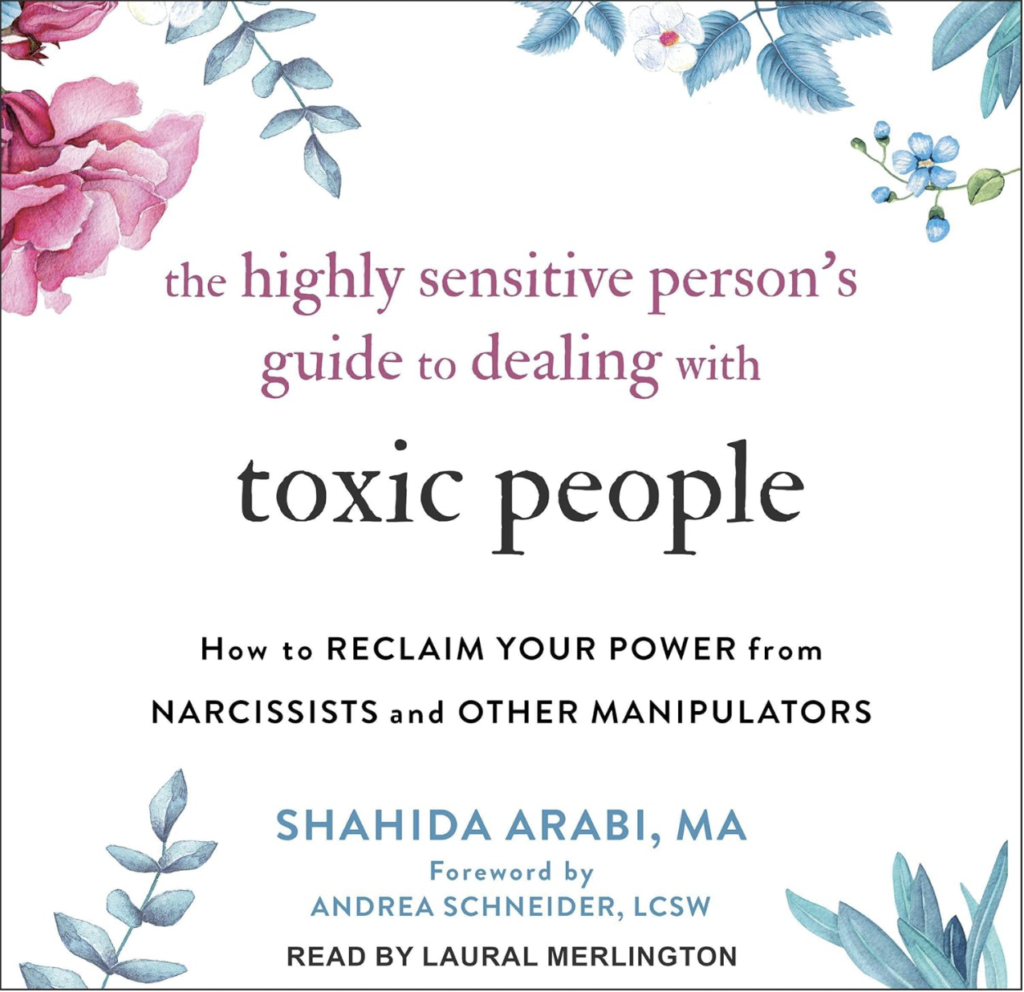Being a Highly Sensitive Person (HSP) means you experience life deeply, feeling everything more intensely—both the joys and the challenges. While this heightened sensitivity can be a gift, it can also make navigating toxic relationships especially difficult. HSPs tend to be more empathetic, more aware of emotional nuances, and more affected by negative energy, which makes dealing with toxic people particularly draining.
In this article, we will explore how HSPs can recognize toxic people, protect their energy, and implement strategies to maintain their emotional well-being. Whether the toxic individual is a coworker, friend, family member, or partner, these tips will empower you to thrive, even in challenging environments.
1. Understanding the Nature of Toxic People
Toxic individuals are often manipulative, controlling, or emotionally harmful to others. Their behavior can leave you feeling drained, anxious, or overwhelmed. For Highly Sensitive People, this emotional weight is amplified, as they absorb others’ emotions more intensely than non-HSPs.
Common traits of toxic people include:
- Manipulation: They use guilt, shame, or coercion to control you or get what they want.
- Narcissism: They focus excessively on their own needs and show little concern for others’ feelings.
- Emotional instability: Their mood swings can create an unpredictable environment, making you feel anxious or insecure.
- Victim mentality: They consistently cast themselves as victims in every situation, refusing to take responsibility for their actions.
- Jealousy and competition: Toxic people may belittle your achievements or happiness to make themselves feel superior.
Recognizing these traits is the first step for HSPs to safeguard themselves from the negative effects of toxic relationships.
2. The Impact of Toxic People on Highly Sensitive Individuals
Highly Sensitive People tend to be more attuned to their surroundings and the emotions of others, which means toxic behavior can leave a deep imprint. Because HSPs often absorb the energy of others, being around toxic individuals can cause them to experience:
- Emotional exhaustion: Constant exposure to negativity can leave HSPs feeling drained, as their empathy compels them to invest emotionally in others.
- Anxiety and stress: The unpredictable nature of toxic people can trigger anxiety in HSPs, who crave stability and harmony.
- Self-doubt: Toxic individuals may criticize or undermine the HSP’s sensitivity, leading to feelings of inadequacy or guilt for setting boundaries.
- Overwhelm: Toxic people often create chaotic environments that make HSPs feel overloaded and unable to process their emotions effectively.
3. Recognizing the Early Warning Signs
For HSPs, it’s essential to recognize toxic people early on to protect their emotional energy. Here are some early warning signs to watch for:
- You feel drained after interacting with them. If you regularly feel exhausted, anxious, or upset after spending time with someone, this is a red flag.
- They dismiss your feelings. Toxic people often invalidate your emotions, calling you “too sensitive” or overreacting when you express discomfort.
- Constant negativity. If someone is always complaining, playing the victim, or focusing on what’s wrong without ever seeking solutions, their negativity can quickly rub off on you.
- Lack of empathy. Toxic individuals are usually self-centered and show little concern for your feelings, making you feel unappreciated or used.
Once you identify toxic behavior, it’s crucial to take action before the relationship escalates and starts affecting your mental and emotional well-being.
4. How to Set Boundaries as an HSP
Setting boundaries can be challenging for Highly Sensitive People, who often feel guilty or anxious about disappointing others. However, establishing clear boundaries is essential for protecting your emotional health when dealing with toxic people.
Here’s how you can set boundaries effectively:
- Identify your limits. Take time to reflect on what behavior you’re willing to tolerate and what crosses the line. Be specific about what drains or stresses you, such as negativity, criticism, or manipulation.
- Communicate your needs clearly. When setting boundaries, use direct and firm language. For example, say, “I need some time alone after work to recharge, so I won’t be available for calls during that time.”
- Use “I” statements. Avoid blaming or accusing the other person. Instead, focus on your feelings. For example, “I feel overwhelmed when we only talk about negative things. Can we focus on positive topics too?”
- Follow through consistently. Once you’ve set boundaries, enforce them without feeling guilty. Toxic people often test boundaries, so consistency is key to maintaining your mental health.
Setting boundaries is an act of self-care, not selfishness, and will help you preserve your energy for people and activities that uplift you.
5. Shielding Yourself Emotionally
Highly Sensitive People are emotional sponges, often absorbing the negative energy of others. To protect yourself from the emotional toll of toxic people, consider using these strategies:
- Practice grounding techniques. Grounding exercises, such as deep breathing, meditation, or visualization, can help you stay present and calm during difficult interactions. Apps like Headspace or Calm offer guided meditation sessions specifically designed to reduce stress and anxiety, and these platforms often have affiliate programs for easy recommendations.
- Limit exposure. If possible, limit the amount of time you spend with toxic people. You don’t have to cut them off completely, but minimizing interactions can prevent emotional burnout.
- Visualize a protective shield. Many HSPs find it helpful to imagine an invisible barrier around them when dealing with toxic individuals. This mental shield acts as a boundary, allowing you to observe the toxic person’s behavior without absorbing their negative energy.
- Practice emotional detachment. Emotional detachment doesn’t mean being indifferent. Instead, it means separating your emotions from the other person’s drama. Remind yourself that their actions and emotions are not a reflection of your worth.
Learning to shield yourself emotionally will prevent you from becoming overly entangled in the toxic dynamics around you.
6. Seek Support from Like-Minded People
Highly Sensitive People thrive when surrounded by supportive, understanding individuals. If you’re dealing with toxic people, it’s crucial to have a solid support system of friends, family, or online communities who understand your sensitivity and can offer advice and encouragement.
- Join support groups. Consider joining online forums or groups specifically for Highly Sensitive People. Communities like The Highly Sensitive Refuge provide resources and support tailored to the HSP experience.
- Seek professional help. If dealing with toxic people becomes overwhelming, working with a therapist—especially one familiar with the needs of HSPs—can provide you with coping tools and emotional support. Websites like BetterHelp offer online therapy options, often with affiliate programs, allowing you to recommend their services to others.
Having a supportive network in place will help you feel less isolated and more empowered to handle toxic people.
7. Know When to Walk Away
While it’s possible to manage interactions with toxic people, there are times when walking away is the healthiest choice. For Highly Sensitive People, staying in a toxic relationship can lead to long-term emotional and psychological harm. If the relationship consistently drains your energy, undermines your self-esteem, or causes you significant stress, it may be time to let go.
Here’s when you know it’s time to walk away:
- Your boundaries are consistently disrespected. If the toxic person refuses to respect your limits, it’s a sign that they are not interested in changing their behavior.
- You feel emotionally unsafe. If the relationship causes you anxiety, fear, or distress on a regular basis, prioritize your emotional safety and distance yourself.
- There’s no mutual effort to improve the relationship. Toxic relationships often require both parties to be willing to change. If the other person is unwilling to acknowledge their behavior or make an effort to improve the relationship, it’s a sign that walking away is the best option.
Ending toxic relationships can be painful, but it’s essential for maintaining your emotional well-being as a Highly Sensitive Person.
8. Focus on Self-Care and Healing
After dealing with toxic people, it’s essential for HSPs to focus on self-care and emotional healing. Self-care allows you to replenish your energy, reconnect with yourself, and build resilience against future toxic encounters.
- Engage in activities that bring joy. Whether it’s spending time in nature, reading, or practicing a creative hobby, prioritize activities that make you feel at peace.
- Practice mindfulness. Mindfulness techniques, such as meditation or yoga, help you stay grounded and release negative energy. Apps like Insight Timer offer free meditation sessions tailored to relaxation and emotional healing.
- Journal your feelings. Writing down your experiences can help you process emotions and gain clarity on how to move forward.
- Establish a daily routine. Having a consistent routine, especially one that includes moments of stillness, helps Highly Sensitive People feel grounded and in control of their environment.
By focusing on self-care, you’ll build emotional resilience, which will help you handle toxic people more effectively in the future.
If you’re a Highly Sensitive Person (HSP) seeking practical strategies to navigate difficult relationships, The Highly Sensitive Person’s Guide to Dealing with Toxic People : How to Reclaim Your Power from Narcissists and Other Manipulators is an essential read. This book offers insightful advice tailored to HSPs, helping you set boundaries, protect your emotional well-being, and maintain healthy relationships. With clear steps to manage toxic individuals, it empowers you to thrive in environments that often feel overwhelming, making it a valuable resource for reclaiming peace and control in your life.
꧁ Conclusion
Dealing with toxic people is challenging for anyone, but for Highly Sensitive People, it can be especially overwhelming. Recognizing toxic behavior, setting clear boundaries, and protecting your emotional energy are essential steps to maintaining your well-being. Remember, you are not obligated to tolerate toxicity. By surrounding yourself with supportive people, practicing self-care, and knowing when to walk away, you can thrive even in the face of challenging relationships.
As an HSP, your sensitivity is a strength—nurture it by creating an environment filled with positivity, support, and love.




